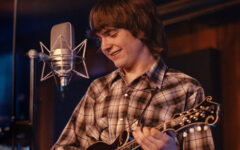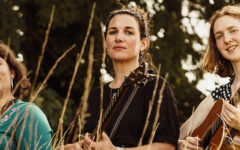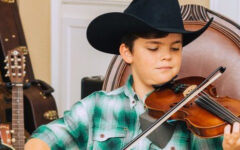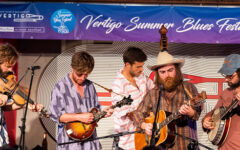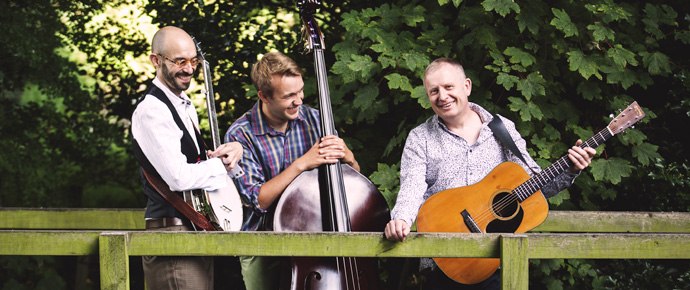
Based in rural Norfolk and Lincolnshire in the UK, The Basstree String Band have a deep understanding of the sounds that are at the very roots of bluegrass, in both sound and tradition. Their sound is both classic and contemporary, boasting high harmonies and astute musicianship that’s searing, soulful, and knowing. That’s evident in their eponymous debut five song EP, which earned widespread accolades from radio programmers near and far.
Despite having first formed in 2017, the members of the trio are highly acclaimed in their own right. Banjo player Howard Burton is a regular at the workshops he leads when he’s not teaching teaches classics in his native Norwich. Flatpick guitarist Mark Jones developed his chops in East Tennessee, and he and Burton have performed together for over 25 years including their dual role in the Dude Coopers, a band that’s been active on the British festival circuit for the past 12 years. Bassist Asa Hardy-Brownlie is the band’s multi-instrumentalist, and his background is based in traditional American music and gypsy jazz.
Bluegrass Today had opportunity to speak with the three men, and we asked them to share their origins and thoughts about today’s bluegrass environs
For starters, tell us what spurred your interest in bluegrass? What inspired you early on?
Howard : It was the sound of the banjo that I liked, especially tunes like Dueling Banjos. In fact, it was my first goal early on to be able to play that tune. I had no idea about bluegrass music till a lot later on, because there was no internet when I started out. That made it difficult to find other musicians, but eventually I did, and the world of bluegrass music opened up.
Mark: I had played the guitar since I was 14, practicing various styles. However my interest in bluegrass and flatpicking was triggered by a friend, Richard, whom I shared a house with in Cambridge. His Dad was an academic at the University of Wisconsin, and whilst visiting his dad in Madison, he heard a neighbor picking a banjo in his garden. That spurred his interest to pick up the banjo and he, in turn, introduced me to Doc Watson, David Bromberg, and the Johnson Mountain Boys through his record collection. That same year, Richard and I went to the Edale Bluegrass festival where we saw Doyle Lawson, Russell Moore, Scott Vestal, and Terry Heaton topping the bill. I asked Doyle about it some years later, and he said, “It was a different sort of dampness, one that gets right into your joints!” I also recall going to the Cambridge Folk Festival around that same time and buying as many Doc Watson, Kentucky Colonels, and Dan Crary records as I could afford.
Asa : I started learning the piano when I was eight. When I was about ten, we had a family friend come and stay, and he taught me the 12-bar blues on piano. The tones, scales and chords stuck with me in the back of my mind. I dabbled with the clarinet and then started learning guitar at 15, but I struggled to feel a connection with any contemporary music. Through YouTube and some chance Jools Holland viewings, I rediscovered blues and ragtime and the fire was reignited.
From blues, I discovered Django Reinhardt and that developed into an interest in early jazz and then modern jazz, alongside discovering Little Richard, Chuck Berry, and Buddy Holly.
I bought a double bass after seeing The Two Man Gentlemen Band. Fuller Condon was a delight to watch on the upright bass, and his finesse and energy completely obsessed me with the instrument. My double bass teacher sent me some clips of some excellent bass players from various genres, one such clip featured the Punch Brothers. I loved the music and it was through them that I discovered Tony Rice and Flatt and Scruggs.
How did the band come together?
Howard: Mark and I have known each other for more years than we care to remember, and we played in other bands together before. Asa was a chance meeting at a local bluegrass session in Norwich. He happened to be walking by and heard the music, and offered his services as a bass player should we ever need one. Of course we got right back to him and the rest is history as they say.
Is there an audience for bluegrass in the U.K.?
Howard: I would say that bluegrass music is still somewhat of a rarity in the UK, but if someone hears it in a bar or club they often enjoy it, but might not know what genre of music it is. There are several dedicated bluegrass festivals during the summer months which helps to celebrate the music and give bands a platform to play on. Its true that there is a lot of crossover between folk and bluegrass, and we mustn’t forget that bluegras’s roots are with the folk music of the British Isles after all. Having said that, we mostly like to play traditional and contemporary bluegrass music. We do however sneak in a Patsy Cline and Ray Price song in the set occasionally for balance.
Mark: The UK is certainly bluegrass friendly, with a long-standing festival scene, music camps and folk festivals that regularly book bluegrass acts. Ireland in particular has an established bluegrass circuit of venues and festivals, and very often bluegrass bands will tour Ireland before coming over to England. The 100 club in central London has a long history of booking bluegrass bands, and people who are just into the music will also put on events there. I recall Bill Monroe played in Newmarket in Suffolk, after being booked at their local bluegrass club.
Asa : I think there is and there isn’t; everyone I have invited to a gig has loved the energy and subject matter of the songs, but I do get exhausted having to constantly answer the question “Bluegrass? What’s bluegrass?” I would like to see more bluegrass around the UK and seeing the genre becoming more mainstream. I am keen to start writing some original material with a British twist…watch this space!
What kind of spin do you put on the music that perhaps reflects your home country traditions?
Mark: While there is clearly a link with tunes travelling from Glasgow or Liverpool over to the US in a rich Celtic connection, our band very much reflects our musical upbringing, which for Howard and I was bluegrass, and for Asa was gypsy jazz and old time country. As a trio, we have to keep our choice of material varied to maintain audience interest, but it doesn’t stray too far from the bluegrass idiom. However, it is really important to make your stamp on the music, and so we spend a lot of time working up our own arrangements or idiosyncrasies to our material irrespective of source.
Do you play original material, covers, or a bit of both?
Howard: At the moment, mostly covers
Do you find that audiences are receptive to this music? What kind of reaction do you get when you perform?
Howard : Mostly we get a very good reception from audiences. As mentioned earlier, most people enjoy the music, but they may not be able to put a name to it.
Where have you played? Do you tour? Have you been to the States?
Howard: We have played at venues all over the UK, from Scotland to Cornwall. We also toured Ireland last year which was a great experience. Mark and I have both toured in the States, but not with the current band. However, we are hoping to arrange a tour in the not too distant future.
Mark: I lived in Indiana and Tennessee for three years. My wife is from Kentucky and we met at the IBMA in Louisville. My son was born in Knoxville. On my first trip to the US in 1996, after going to MerleFest with a banjo-playing friend from Cambridge, we were en route to the Lewis Family festival in Georgia, when we decided to stop in East Tennessee and went to Old Timers Day in Townsend. We had a whale of a time meeting what would turn out to be good friends who would remain close for the next 20 years.
Have you ever performed with any notable name artists?
Howard: I have been fortunate to meet and jam with many of my banjo heroes over the years, including Jim Mills, Tony Trischka, Pete Wernick, JD Crowe, and the late great Bill Keith who I performed with in Ireland many years ago. I’ve also played with Kenny & Amanda Smith at Grayson highlands state park
Mark: I’ve played with Michael Cleveland, Bill Keith, Wyatt Rice, Aubrey Haynie, Sammy Shelor, and Elmer Burchett, mostly at the IBMA in Louisville. I have also played a few times with Steve Kaufman. Steve and his family travelled to the UK to research Celtic fiddle tunes, and I introduced him to some Irish fiddle-playing friends in Cambridge. We played again at my wedding in Tennessee and also at one of his shows the Palace Theatre in Maryville, Tennessee.
What do you think accounts for bluegrass’ popularity, especially worldwide?
Howard : I always think of bluegrass music as being a social music with a sense of community. You can visit any part for the world, and even if you don’t speak the language, when you play or sing that doesn’t matter at all. Any language barrier just melts away.
Mark: As Howard said, it’s the social connection of the music that underscores its popularity. The creativity and improvisation that is explosive in its most creative hands will win over an prospective convert. How can anyone who listens to Del McCoury for the first time not be moved ?
Asa: The music is simple and easy to enjoy. The “standards” of the genre mean that new musicians are able to get to their grip on the music, and play with some of the best very easily.
To the average person it provides a break from electronic sounds. You can hear what is going on and every instrument/voice that is contributing to it. The songs are timeless and the subject matter is always relatable.

